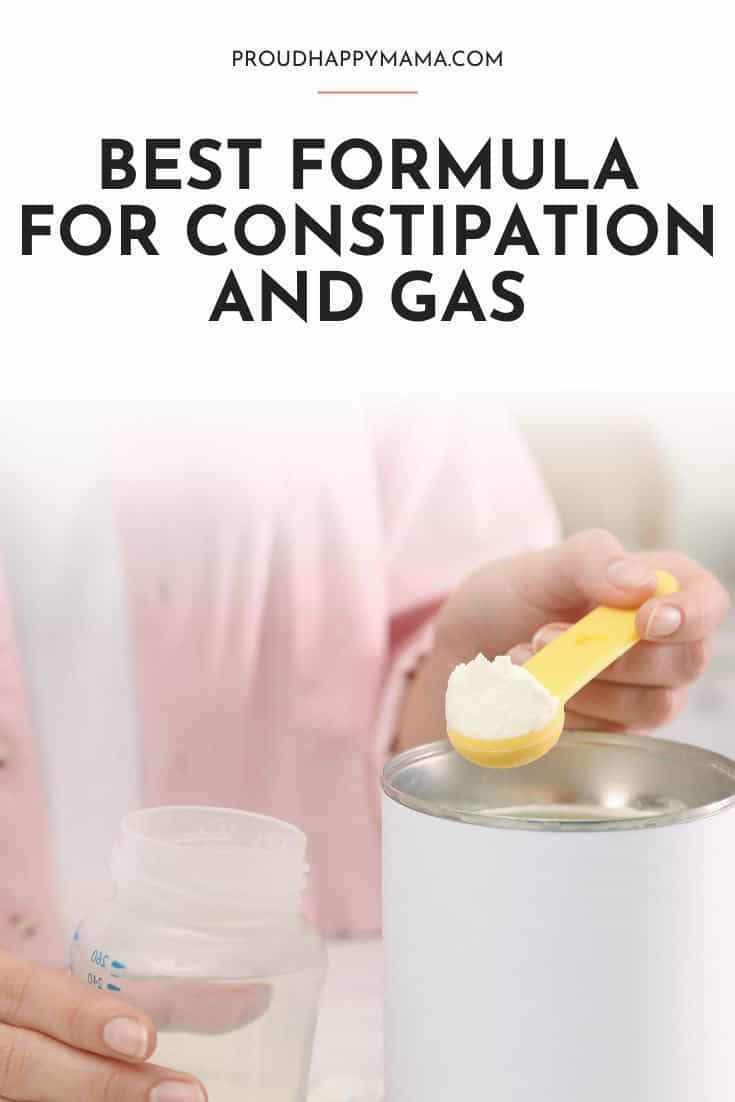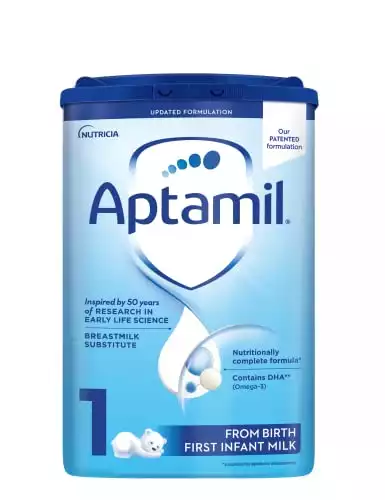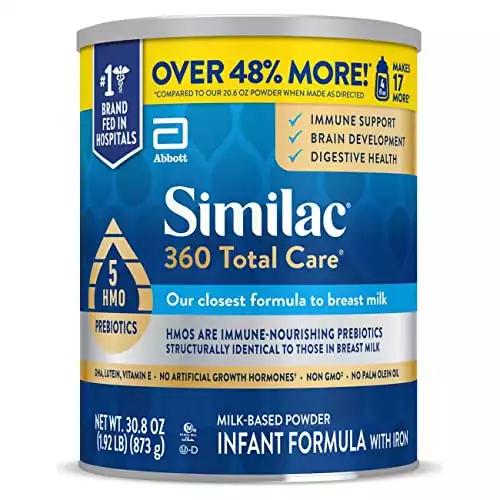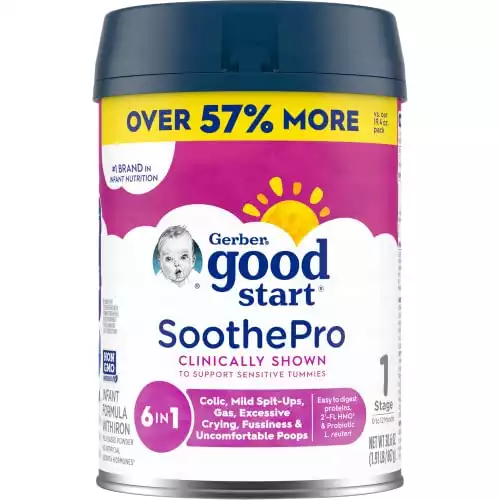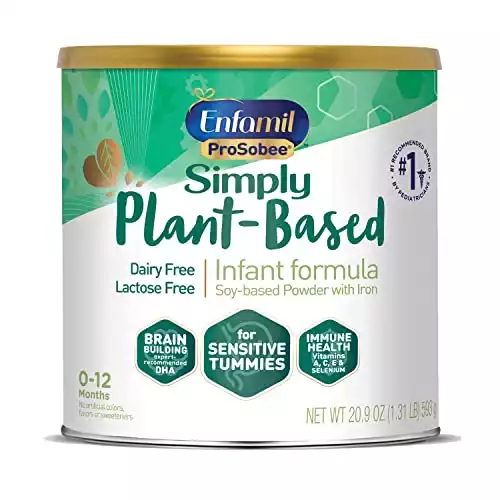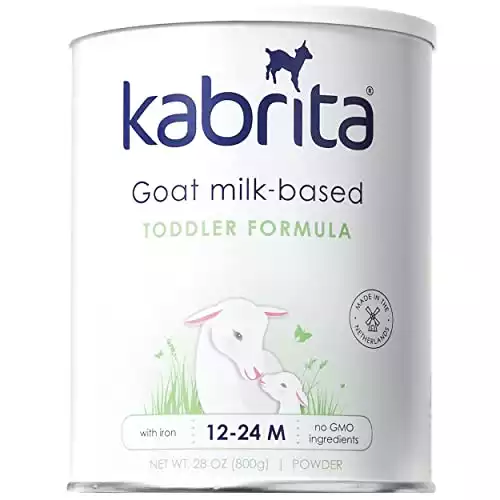Best Formula For Constipation And Gas
Looking for a formula that can treat constipation in your little one and stop it coming back?
Then our guide on the best formula for constipation and gas is for you!
Let’s be honest: few of us really expect constipation to be an issue when raising a baby. Full and leaking diapers are very much expected, but a lack of poop is rarely a top concern! We’ve all felt that moment of relief when a potentially full diaper has turned out to be empty!
But constipation and gas are two issues that many parents have had to face. Constipation is more common in formula fed babies, as the thicker liquid moves slowly through the digestive system. Standard formulas also have bigger molecules than breast milk, which can cause further digestion problems.
A change in formula can help to relieve these issues, particularly if your child is suffering from a food intolerance. However, choosing the right formula for constipation isn’t always an easy choice — expect some trial and error!
So in this guide, we’ve rounded up the best formulas for constipation and gas, including their pros and cons. Plus a handy buyers guide on how to choose the best infant formula for gas and constipation for you and your baby.
And if you love this guide to the best baby formula for constipation and gas, make sure you check out these guides on the best formula for colic and gas, best formula for spit up and gas, and best formula that tastes like breast milk. Or even our guide on does baby formula expire?
This post contains affiliate links. See our full disclosure here
When it comes to aiding in constipation and gas in your little one, Aptamil First is our top pick.
This formula has been created with HMO 3’GL* and dual prebiotics GOS/FOS that feeds the good bacteria in the gut and promotes softer and regular stools that are closer to that of breastfed infants.
Aptamil Stage 1 also delivers DHA to help support brain & eye development, and Vitamin C & D to help support the immune system.
It also created without corn syrup or palm oil.
List Of The Best 5 Formulas For Constipation And Gas
best formula for constipated baby
1. Aptamil Stage 1 Baby Formula
Best Overall Baby Formula for Constipation
Aptamil is the most popular baby formula in Europe, and it’s becoming increasingly recognized in the US. Free from corn syrup and other forms of processed sugars, Aptamil is a complete formula that can help tackle constipation in your little one.
Aptamil Stage 1 has been carefully designed to mimic the consistency and quality of breast milk. It’s packed with nutrients such as 3’GL HMO and the prebiotics GOS/FOS, which help develop good bacteria in the gut. These bacteria help create softer, more regular poop, closer to the consistency of a breastfed baby!
Aptamil Stage 1 also contains no palm oil. Palm oil has been linked to constipation, and can also limit how much calcium the body absorbs. Palm oil is used to mimic the fatty acid levels of breast milk, but this can be replaced with other ingredients!
To better replace breast milk, Aptamil has included DHA, vitamin C, and vitamin D. These help develop the brain, eyes, and the immune system.
Pros
- Contains HMO 3’GL and GOS/FOS – Promotes healthy gut bacteria, and softer, consistent stools.
- No palm oil – Palm oil has been linked to constipation, and can limit how well calcium is absorbed.
- Taste and smell – A gentle and pleasant taste, popular with babies.
Cons
- Price – Aptamil can be hard to find in stores, and expensive to buy.
When it comes to aiding in constipation and gas in your little one, Aptamil First is our top pick.
This formula has been created with HMO 3’GL* and dual prebiotics GOS/FOS that feeds the good bacteria in the gut and promotes softer and regular stools that are closer to that of breastfed infants.
Aptamil Stage 1 also delivers DHA to help support brain & eye development, and Vitamin C & D to help support the immune system.
It also created without corn syrup or palm oil.
Also available for purchase from Walmart.
2. Similac 360 Total Care Infant Formula
Best Similac Formula for Gas and Constipation
By mimicking breast milk as closely as possible, Similac 360 Total Care infant formula passes easily through the digestive system. Along the way, it provides your little one with all the nutrients and nourishment that they need.
Similac 360 Total Care contains 5 HMO prebiotics, identical in structure to those found in breast milk. This exclusive blend builds and strengthens the immune system, helping protect against illnesses that can cause stomach issues. They also nurture the good bacteria found in the gut. This formula supports digestion, for more comfortable feeds (and more comfortable poo)!
Similac have added plenty of good things to the 360 Total Care formula, to make sure your little one is getting everything they need. Parents will also love the ingredients that Similac didn’t include: there are no GMOs, and no artificial growth hormones. Similac 360 Total Care is also made with no palm olein oil, which can cause constipation.
Formulated as close to breast milk as possible, Similac 360 Total Care promotes soft and regular stools.
Pros
- HMO blend – Containing 5 HMO prebiotics, 360 Total Care mimics the gut health properties of breast milk.
- No palm olein oil – Omitting the palm olein oil promotes softer stools (and better calcium absorption).
- Contains DHA, lutein, and vitamin E – This supportive blend helps with eye and brain development.
Cons
- The formula can be slow to dissolve.
Also available for purchase from Walmart and Target.
3. Gerber Good Start Baby Formula SoothePro
Best For Sensitive Tummies
Considering how quickly they start guzzling milk, it comes as some surprise that a newborn doesn’t have a fully developed digestive system! Stomach problems, including constipation and gas, often occur because the tummy isn’t quite ready yet. A gentle formula, such as Gerber Good Start SoothePro, can help ease the digestion process, and alleviate stomach issues.
Gerber Good Start is designed to provide your little one with the best start to life, mimicking breast milk closely with a supportive blend of prebiotics, probiotics, and comfort proteins. These nurture the good bacteria found in the gut, promoting soft and regular stools.
Probiotics such as 2’-FL HMO and L. reuteri help nourish the good bacteria, developing the immune system and improvising digestion. A gentle formula, using smaller proteins for easier digestion, Gerber Good Start SoothePro works to alleviate all kinds of tummy problems.
Gerber Good Start SoothePro contains no GMO ingredients and no artificial growth hormones. However, it does include palm olein oil as part of a vegetable oil blend.
Pros
- Contains 2’-FL HMO and L. reuteri – These probiotics nurture good bacteria, supporting digestive health and the immune system.
- Hydrolyzed proteins – Made using broken down proteins that are easier for the stomach to digest.
- 6-in-1 – The gentle formula can help with a range of digestive issues.
Cons
- Slow to dissolve – The formula can clump, and might need a good shake during the feed.
The gentle formula is popular among parents with colicky babies, thanks to the easy to digest proteins.
We love that the proteins are smaller than other formulas making it easier for young tummies to break down, putting less strain on the digestive system which can lead to reduced gas, and less colic symptoms.
It also has added HMO and the probiotic L. reuteri. to help support digestive health and build immunity.
As well as you can also rest assured knowing that it is a non-GMO formula.
Also available for purchase from Gerber.
4. Enfamil ProSobee Plant Based Infant Formula
Best Soy Based Formula
Soy-based formulas aren’t right for every family, but if your little one is struggling with a lactose intolerance, they can be a game changer. Enfamil ProSobee Plant Based Infant Formula is one of the best soy-based formulas for sensitive stomachs.
Dairy and lactose free, Enfamil ProSobee can support babies with a cow’s milk or lactose intolerance. (Constipation can be caused by both cow’s milk and lactose). A soy-based formula removes these elements, aiding digestion. ProSobee also contains nutrients designed to support digestive health and the immune system.
As well as supporting digestion, Enfamil ProSobee contains everything your baby needs for healthy development. ProSobee contains the same DHA as the rest of the Enfamil formula family, which is shown to support brain development and learning ability up to 5 years of age!
A switch to soy isn’t always the right choice. For some, soy might actually make the problem worse! If you’re thinking of using a soy-based formula, speak to your pediatrician. They can help you decide if this is the right choice for your little one’s stomach.
Pros
- Lactose free – Contains no lactose, a sugar that the stomach can struggle to digest.
- Dairy free – Made using soy proteins, ProSobee can help babies with cow’s milk allergies.
- Taste – All soy formulas have an unusual taste, but ProSobee is among the best.
Cons
- Price – ProSobee is expensive, even for a soy-based formula.
Also available for purchase from Walmart and Walgreens.
5. Kabrita Goat Milk Toddler Formula
Best Formula For Toddlers
While cow’s milk might be the traditional base for formula, goat’s milk is an increasingly in-demand alternative. Kabrita Goat Milk Toddler Formula is a nutritious cow’s milk alternative that can potentially help relieve digestive issues.
Cow’s milk sensitivities can cause all kinds of digestive distress in children, including gas and constipation. While the proteins in goat’s milk are similar to the proteins in cow’s milk, they’re easier on the stomach, for better digestion. Kabrita have specially adapted the whey-to-casein protein ratio, for even better digestion.
Still not convinced on goat milk? Kabrita is a mild and sweet tasting formula, and even fussy babies are likely to enjoy the taste! And as a parent, you can be reassured that Kabrita includes 24 vitamins and minerals, for healthier growth.
Kabrita is recommended for children between 12 and 24 months. If you want to feed younger children Kabrita, consult with your pediatrician.
Pros
- Easy to digest proteins – Goat’s milk proteins are easier on the stomach, for improved digestion.
- Adapted whey-to-casein protein ratio – A better protein ratio for digestibility.
- 24 vitamins and minerals – Kabrita formula is packed with all the nutrients your child needs.
Cons
- Age range – Kabrita is only suitable for those 12 months and older.
Also available for purchase from Kabrita USA.
Buyer’s Guide on the best formula to prevent constipation
You might think you’ll never miss a full diaper, but when your little one isn’t experiencing regular bowel movements, you’ll probably start to panic. Constipation and gas can be uncomfortable for babies. It can also put them off their food, leading to problems gaining weight.
Some mild constipation isn’t necessarily a cause for concern. There are multiple factors that might have caused it, and within a few days, it should pass. However, if your little one has regular problems pooping, or goes through a prolonged period of constipation, you should speak to a pediatrician. It might be time for a formula change.
Let’s take a look at some of the key elements to look for when choosing a formula for constipation and gas.
Protein Base
Proteins are an essential part of any diet, and they’re particularly important for your little one! But while protein is an absolute necessity, it can cause digestive issues, especially in young tummies. Proteins are often hard to digest, triggering reactions such as constipation and gas.
The most common protein base for formula is cow’s milk. Although it’s the most popular protein base, not all babies are happy with cow’s milk. Some suffer from cow’s milk allergies, which can cause constipation.
Goat’s milk is a cow’s milk alternative. It has a similar protein base, but it is easier for the body to digest.
Alternatively, soy and plant based protein bases can be used. These don’t contain lactose, which can trigger reactions, and will benefit babies who have had constipation caused by cow’s milk.
Additional Nutrients
The best baby formulas are those that closely mimic breast milk. If your baby is struggling with constipation, then these carefully crafted formulas might be the best option. Boosted with prebiotics, probiotics, and vitamins and minerals, these breast milk formulas are easier to digest.
Formulas that closely mimic breast milk also include the prebiotics needed to grow a healthy immune system, and support the digestive system. As your baby is still growing, they’re still nurturing the good bacteria the gut needs. The right formula can help develop that good bacteria, for better digestion.
Formulas From Europe
Any European formula approved for sale in the US has to pass FDA regulations, so they are held to the same standard as American brands. These European brands have also passed EU regulations, which limit the sugars and sugar substitutes used in formula. For that reason, European formulas are often recommended to alleviate constipation.
If you do choose a European formula, make sure you understand what developmental stage that formula is aimed at. Although the majority of these formulas will include an English translation on the label, they can use different terminology to denote age range.
Texture
When you mix up a formula, some will turn to froth, while others remain completely flat. Most fall somewhere between the two, and either gradually lose bubbles, or stay frothy throughout a feed. For constipation and gas, look for formulas that stay flat when mixed.
Formula is more likely to cause constipation than breast milk because it’s thicker – it takes more time to make it through the GI tract. If you’ve been using a formula that seems particularly thick, you might want to switch to a thinner alternative. Double check you’re mixing the formula in the right proportions, as well.
Palm Oil/Palm Olein Oil
Take a look at the label for infant formula, and you might be surprised by how much of it is made of vegetable oil. This is used to create a similar fatty acid profile to that found in breast milk.
One oil you might notice is palm oil, or palm olein oil. Again, this adds to the fatty acid composition of the formula. However, these oils can limit how much calcium the body can absorb. They have also been linked to harder stools, and are seen as a potential source of constipation.
Do You Need To Switch Back?
If you’ve recently made a change in formula and noticed an issue with constipation, then you might need to switch back! Unnecessary formula changes can actually cause constipation, gas, and other uncomfortable digestive issues.
Of course, we can’t always anticipate a change in baby formulas. Sometimes, your preferred brand just disappears off the shelf! If you really can’t find your first choice formula, consider one of these gentle options listed above.
When it comes to aiding in constipation and gas in your little one, Aptamil First is our top pick.
This formula has been created with HMO 3’GL* and dual prebiotics GOS/FOS that feeds the good bacteria in the gut and promotes softer and regular stools that are closer to that of breastfed infants.
Aptamil Stage 1 also delivers DHA to help support brain & eye development, and Vitamin C & D to help support the immune system.
It also created without corn syrup or palm oil.
FAQs on formula for gassy and constipated babies
Yes, formula fed babies are more likely to develop constipation that breastfed babies. Formula is thicker than breast milk, which means it takes longer to pass through the GI tract. Formula also typically contains larger molecules than breast milk, which are harder to digest.
All babies are different, and what causes an upset stomach in one can be digested happily by another. Formula feeding won’t always cause constipation, but if your baby isn’t happy with a formula, it can lead to digestive issues, including constipation and gas.
While the texture and structure of infant formula might be causing constipation, sometimes the ingredients can trigger an allergic reaction.
Breastfed babies can also experience constipation. This might be linked to the components of breast milk. However, it might just be a sensitive digestive system getting used to food.
Constipation doesn’t refer to how often your baby has a bowel movement, but how hard the stool is. Large stools that look like pellets, crying while passing a bowel movement, and a bloated stomach are all signs of constipation.
Babies run on all kinds of toilet schedules. Formula fed babies might pass a stool several times a day, or a few times a week. If they’re going less than three times a week, this is often a sign of constipation. For babies under 8 weeks, contact a pediatrician if they haven’t gone in 2 or 3 days.
The biggest indication of constipation is hard, pellet-like stools. However, tracking your baby’s bowel movements can help you spot a problem. Keep an eye on their usual schedule, so you can see notable changes.
Yes, changing infant formula can potentially help with constipation. If your little one has a food allergy or sensitivity, then the formula might be causing constipation and gas. Try using a different protein base, or a formula with broken down proteins, for easier digestion.
Changing formulas isn’t guaranteed to help constipation. Before you switch, make sure you’re mixing the formula correctly, so your little one is getting enough liquids. Try massaging their stomach, and moving their legs, to encourage bowel movements.
Final Thoughts on best formula for constipation
Constipation and gas are both uncomfortable, and can put a real strain on feeding time. Changing formula isn’t a guaranteed solution, but it can help your little one move food through their system.
We hope these formula suggestions and tips will help you find the solution to your formula troubles! But if your baby is really struggling with constipation, speak to a pediatrician for personalized suggestions.
And if you want to check out any more of our guides, we recommend checking out these guides on Nutramigen Vs Alimentum, Enfamil Gentlease Vs Similac Total Comfort, Similac Pro Advance Vs Pro Total Comfort, and Enfamil Gentlease Alternative.
When it comes to aiding in constipation and gas in your little one, Aptamil First is our top pick.
This formula has been created with HMO 3’GL* and dual prebiotics GOS/FOS that feeds the good bacteria in the gut and promotes softer and regular stools that are closer to that of breastfed infants.
Aptamil Stage 1 also delivers DHA to help support brain & eye development, and Vitamin C & D to help support the immune system.
It also created without corn syrup or palm oil.
